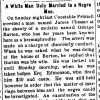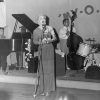calsfoundation@cals.org
LGBTQ+ Movement
The social movement in Arkansas in support of rights for LGBTQ+ people (an umbrella term that covers lesbian, gay, bisexual, transgender, queer/questioning, and more; LGBT was also used in the past) has historically been represented by such legal organizations as Gay and Lesbian Alliance Against Defamation (GLAAD), Lambda Legal, and the American Civil Liberties Union (ACLU). This was followed by an increasing organization of LGBTQ+ people in Arkansas, primarily in the emergence of student groups at the University of Arkansas (UA) in Fayetteville (Washington County) and other institutions of higher education. Despite statewide and nationwide strides toward equality under the law, LGBTQ+ Arkansans still face ongoing discrimination—and the fight for rights, safety, and acceptance is far from over.
Legal Issues and Context
The first reference to homosexuality in the bound index to the now-defunct Arkansas Gazette is from October 1973, four years after the Stonewall Riots (the first “shot” fired in the Gay Revolution, when a group of Greenwich Village gays stood up to police during a raid on the Stonewall Inn, a gay bar in New York) and reads, “see Sodomy.” The article states simply that the state Supreme Court had upheld the then-135-year-old Arkansas law, which read: “Every person convicted of sodomy or buggery will be imprisoned in the state penitentiary for not less than one year nor more than 21 years.” The following month, the U.S. Supreme Court upheld Arkansas’s sodomy law, denying an appeal by two Miller County men convicted of having sex at a public rest area along Interstate 30. The state law was an equal-opportunity statute, applying to “unnatural” sex acts between both homosexuals and heterosexuals.
To put this in perspective, an Arkansas Gazette article from 1973 on a survey released by Playboy magazine reports, “There have been dramatic increases [since the Kinsey Reports] in the frequency with which Americans engage in various sexual activities and in the number of persons who include formerly rare or forbidden techniques in sexual repertoires,” including premarital, oral, and anal intercourse. Whether or not this translates into an actual rise in same-sex behavior is impossible to measure; however, there is little doubt that more people were beginning to talk about such previously taboo subjects as homosexuality in the early 1970s. The number of homosexuals in America was said by the survey to remain “stable” since Alfred Kinsey, who, in his classic 1948 study, found that at least ten percent of men were either “exclusively or predominantly homosexual for at least three years between the ages of sixteen and fifty-five.” The ten percent figure was later adopted by gay activists as an estimate of the homosexual population, although Kinsey had reported a number closer to four percent for the same demographic among women.
In 1974, in a reverse of the previous order, a search under “Sodomy” in the Arkansas Gazette reads, “see Homosexuality.” The two articles in 1974 feature a debate between Larry Stone, the recently crowned Miss Gay Little Rock, and Little Rock police chief Gale F. Weeks. Stone charged the “redneck” police with harassment of gays “at every opportunity,” while Weeks called this “poppycock.” Stone remarked on the beginnings of a “gay liberation” movement in Little Rock (Pulaski County) but claimed that conditions were better for gays in Hot Springs (Garland County) and Fort Smith (Sebastian County). He might have included Fayetteville, where gays had for years mixed openly with “straights” at George’s Majestic Lounge.
In 1977, a revised sodomy law—amended to penalize only homosexual acts, or sexual acts occurring between humans and animals—in effect decriminalized sodomy by making it a Class A misdemeanor. The law was further challenged in the years that followed until it was finally declared unconstitutional under the Arkansas constitution in the March 2001 case of Jegley v. Picado. The 1977 revision, however, was not reflective of attitudes in Arkansas in general. In 1978, for example, a writer was fired from the Lincoln Ledger in Star City (Lincoln County) after suggesting in an editorial that Anita Bryant, the former Miss Oklahoma and Florida orange juice spokesperson turned anti-gay activist, “sit down and shut up” about denying homosexuals equal rights. The writer’s employer, who wrote a signed apology to his readers for the editorial, denied firing him because of the controversy, which drew national attention.
The AIDS Crisis and Backlash
In 1981, a new disease some people were calling “gay cancer” began making headlines. The following year, a thousand cases of the unnamed disease were certified by the Centers for Disease Control in Atlanta, Georgia. In 1983, a Little Rock man in his early twenties was the first in the state to die of a rare form of pneumonia related to what had been named AIDS (acquired immune deficiency syndrome). High-risk groups included promiscuous bisexual and homosexual men, intravenous drug users, Haitians living in the United States, and people with hemophilia. By the close of 2004, the disease had claimed almost 1500 victims in Arkansas.
In the midst of the 1980s AIDS epidemic, Hot Springs native Ruth Coker Burks provided support for dozens of men who were dying of AIDS—men who were often abandoned by their families, with even some health professionals being reluctant to treat them. She also provided for the burial of dozens of men in Files Cemetery in Garland County. (However, 2021 reports by both the Arkansas Times and Today called into question the narrative Burks has given the media. A 2015 GoFundMe campaign to build a memorial to AIDS victims was paused in 2017, with no apparent work on the monument having yet been undertaken; Burks acknowledged spending at least some of the money on her own medical expenses.)
The 1980s had begun auspiciously for gays and lesbians, whose profile in the state had been slowly improving, despite police sweeps in state parks and setbacks in the courts and in the state legislature (in March 1981, a non-credit course in “Understanding Homosexuality” at the University of Arkansas at Little Rock (UA Little Rock) was condemned by both houses of the legislature), but the AIDS crisis inspired a backlash led by quasi-religious groups such as the Moral Majority. The Arkansas arm of the Gay and Lesbian Task Force, established nationally in 1973, was becoming increasingly more aggressive in articulating its agenda, often with help from the ACLU, but hate and sex crimes involving homosexuals were also on the rise. In June 1985, for example, two Central Emergency Medical Service employees and a Springdale (Washington and Benton counties) policeman were charged with exploding a “firecracker bomb” in a Fayetteville park that was set to go off during a gay pride rally led by the Fayetteville Gay and Lesbian Action Delegation and the University of Arkansas Gay and Lesbian Student Association. The latter organization, at the time, was being denied money that was distributed to other students organizations and eventually filed suit against the university, achieving some measure of victory in the court case of Gay and Lesbian Student Association v. Gohn. Among the leaders in the movement at this time was Ralph Allen Hyman, who later ran as the first openly gay candidate for the Arkansas General Assembly.
While gays and lesbians had friends in high places, including Representative Vic Snyder, who attempted, without success, to amend Arkansas’ sodomy laws in 1993, other famous Arkansans were ambivalent. The same President William Jefferson Clinton who nominated openly gay candidates such as James C. Hormel and Roberta Achtenberg to top positions in his administration introduced the controversial “don’t ask, don’t tell” policy to the military in 1993 (both Al Gore and Bill Bradley called for its abolition in the run-up to the 2000 presidential election) and signed the Defense of Marriage Act in 1996.
In 1992, the Arkansas Gazette merged with the Arkansas Democrat, after losing a costly newspaper war, to form the Arkansas Democrat-Gazette. Whereas in 1989 the Gazette had published a “Searching for Acceptance” series on homosexuals, the Arkansas Democrat-Gazette, like its predecessor the Democrat, was seen as less gay-friendly. In 1998, the paper’s policy of publishing the names of persons accused of misdemeanor sex crimes was linked to the suicide of a man arrested for public sexual indecency with another man. David Ivers, a spokesman for GLAAD, in a February 20, 1998, interview with the Arkansas Times, protested the publication of names “in these types of offenses,” alleging that the Democrat-Gazette “didn’t publish the names of heterosexuals arrested on similar charges.”
LGBTQ+ Culture in Arkansas
The 1970s ended on a high note for gay Arkansans, in that a number of straight-friendly gay discos opened in venues around the state. The 42nd Street Disco in Fayetteville enjoyed a two-year run in the back of the UARK Theatre, one of the first cinemas in the country to screen, in 1976, the gay-themed Rocky Horror Picture Show, soon to become a cult classic. A straight-friendly gay dance club called Discovery opened in 1979.
In the arts, authors Alice French (a.k.a. Octave Thanet), Jeanette Howard Foster, and E. Lynn Harris, made their homes in Arkansas. French (1850–1934) was a regionalist whose pioneering collections of short stories, A Slave to Duty and Other Women (1906) and Stories That End Well (1911), embraced the cause of feminism. Originally from Andover, Massachusetts, she and her lifelong partner, Jane Allen Crawford, split their declining years between their homes in Davenport, Iowa, and Lawrence County, Arkansas. Foster (1895–1981) was the author of a seminal work of lesbian research, Sex Variant Women in Literature (1956). Born in Oak Park, Illinois, she retired to Pocahontas (Randolph County) with two other women. A native of Little Rock who divided his time between Arkansas and Georgia, E. Lynn Harris (1955–2009) self-published his first novel, Invisible Life (1991), about a bisexual man torn between his male and female lovers; it then went on to become a bestseller when acquired by Anchor Books. Other noteworthy authors include Peter McGehee, Diana Rivers, Melissa Scott, Daniel Black, and Kai Coggin. Garrard Conley’s debut memoir, Boy Erased (2018), told the story of growing up gay in northern Arkansas and being sent by his parents to conversion therapy when young; it was later adapted into a critically acclaimed movie starring Russell Crowe and Nicole Kidman.
Danielle (Dani) Berry, a revolutionary computer game design pioneer, was a notable trans woman with ties to Arkansas, living in Little Rock most of her teenage and adult life. Born in St. Louis, Missouri, she was assigned male at birth in 1949 and embarked on the process of gender transition in 1992. She died of lung cancer in 1998. V. L. Cox is a lesbian artist from Arkadelphia (Clark County) who made national headlines in 2015 with her art installation End Hate, while Beth Ditto of Judsonia (White County) achieved renown in music, fashion, and acting while also being a fierce advocate for the rights of LGBTQ people.
Arkansas LGBTQ+ Rights and Representation in the Twenty-First Century
In the new century, a number of high-profile cases on both sides of the movement have attracted national press. In 2003, a lawsuit was settled in favor of a fourteen-year-old boy from Jacksonville (Pulaski County) who had been “outed” by officials at his school. As a result, the school officials agreed never again to disclose any student’s sexual orientation and issued a formal apology to the boy and his family for having done so in this case. In December 2004, a challenge to the state’s ban on gay foster and adoptive parents was struck down by an Arkansas judge. In a bizarre footnote to the discrimination issue, a cattle farmer was convicted of spreading manure along the route of a gay pride parade in Conway (Faulkner County) in 2004 after refusing to admit that his was a “hate” crime. Conway’s Pride Parade, started by John Schenck and his husband Robert Loyd in 2004, became an annual event in the city, drawing fewer protesters and more participants over the years.
In the 2004 elections, Arkansas became one of eleven states with a law banning same-sex marriage. This time, however, even the Arkansas Democrat-Gazette came out against the amendment, claiming “it goes too far.” Three-fourths of Arkansas voters disagreed. However, in 2007, the Eureka Springs (Carroll County) city council voted to create a registry of domestic partnerships. Three years later, the city became the only one in Arkansas to provide city employee health insurance coverage for domestic partners.
On June 29, 2006, the Arkansas Supreme Court ruled that gays could not be banned from becoming foster parents. In a unanimous decision, the Court declared such a ban “acts to exclude a set of individuals from becoming foster parents based upon morality and bias” and that “there is no correlation between the health, welfare, and safety of foster children and the blanket exclusion of any individual who is a homosexual or who resides in a household with a homosexual.” The three gay couples who were plaintiffs in the case were represented by the American Civil Liberties Union of Arkansas. State legislators promised to pass a legislative ban during the 2007 session of the Arkansas General Assembly but failed. In 2008, voters approved Initiated Act 1, which banned adoption by any individual “cohabiting with a sexual partner outside of a marriage which is valid under the constitution and laws of this state,” a formulation designed to target gays and lesbians but which also prevented unmarried heterosexuals from adopting children. However, the ACLU again filed suit, and on April 16, 2010, a state judge struck down the ban, stating that it infringed upon the right of privacy of Arkansas citizens.
Chad Griffin, born in Hope (Hempstead County) and raised in the Arkadelphia area, worked on the communications team at the White House during the Clinton presidency. In 2008, in response to Proposition 8, Griffin started the American Foundation for Equal Rights, a legal team fighting orientation and gender discrimination in court. In 2012, Griffin became the president of the Human Rights Campaign (HRC), the largest LGBTQ+ civil rights organization in the nation. He stepped down in 2019.
On May 9, 2014, Pulaski County circuit judge Chris Piazza struck down the 2004 ban on same-sex marriages. Couples began obtaining marriage licenses the next day in some counties, including Carroll County; when they wed on May 10 in Eureka Springs, Kristin Seaton and Jennifer Rambo of Fort Smith became the first same-sex couple to marry in Arkansas. The Arkansas Supreme Court issued a stay on Piazza’s ruling on May 16, ending the issuance of marriage licenses as the decision began going through an appeals process. A separate court case challenging Arkansas’s ban on same-sex marriages was heard in the United States District Court for the Eastern District of Arkansas. On November 25, 2014, Judge Kristine Baker struck down the state’s ban on same-sex marriages in a different lawsuit but stayed her ruling pending the appeal of her ruling to the Eighth U.S. Circuit Court of Appeals. When the U.S. Supreme Court handed down its ruling in Obergefell v. Hodges in June 2015 saying that same-sex marriages were legal everywhere, the Court of Appeals entered a brief, unanimous ruling upholding Judge Baker. The evening that the Obergefell decision was handed down in Washington DC, the Arkansas Supreme Court filed a brief, unsigned ruling saying that all the issues raised in the appeal of Piazza’s ruling were settled and that his ruling that the Arkansas same-sex marriage ban violated both the state and U.S. constitutions was now the law in Arkansas.
In July 2014, Human Rights Campaign (HRC) announced an initiative called Project One America to expand lesbian, gay, bisexual, and transgender equality in the South through permanent campaigns in Alabama, Mississippi, and Arkansas. Earlier in 2014, HRC surveyed Arkansans to determine the needs, experiences, and priorities of LGBT people in Arkansas. Among the survey’s findings were that about sixty percent of LGBT people who live in Arkansas have been residents for more than twenty years, and that Arkansas has one of the highest percentages of LGBT people raising children of any state in the country.
On August 19, 2014, the Fayetteville City Council approved a civil rights ordinance to protect LGBT people in Fayetteville from discrimination in housing, employment, and public accommodations. However, voters overturned the ordinance on December 9, 2014. In early 2015, the Arkansas General Assembly, the majority of whose members now belonged to the Republican Party, passed SB 202; widely seen as a response to Fayetteville’s attempted ordinance, the law forbade municipalities from passing ordinances protecting groups not already protected under state law. SB 202 struck many observers as an attempt at preserving discrimination against LGBT people. During the bill’s development, however, the city of Eureka Springs passed its own civil rights ordinance protecting LGBT people; a later attempt to overturn the ordinance at the ballot box failed. Conway followed suit with an ordinance adding “sexual orientation” and “gender identity or expression” to the city’s official equal-opportunity statement, with North Little Rock (Pulaski County) doing likewise soon thereafter. Little Rock itself, on April 21, 2015, extended its civil rights protection to cover sexual orientation and gender identity, in addition to requiring that companies wanting to do business with the city also practice non-discrimination. Hot Springs followed suit the following month, and even the small community of Marvell (Phillips County) unanimously passed a non-discrimination ordinance on June 11, 2015. On June 16, 2015, Fayetteville succeeded in passing a new, modified ordinance protecting individuals on the basis of sexual orientation and gender identity. However, the Supreme Court of Arkansas, on February 23, 2017, reversed a circuit court ruling upholding Fayetteville’s ordinance, and on January 31, 2019, the Court ruled definitively that state law overrode the ordinance.
On March 31, 2015, the Arkansas General Assembly passed HB 1228, titled the “Religious Freedom Restoration Act.” The law would have allowed employees of state and local government, as well as private individuals, to cite “sincerely held religious beliefs” in refusing to undertake certain actions, such as the implementation of laws. From its inception, the bill was widely criticized as a means of permitting discrimination against gays, lesbians, bisexuals, and transgender people, especially given that the lead sponsor, Representative Bob Ballinger, refused to allow protections for sexual orientation and gender identity to be added. The Arkansas chapter of the Human Rights Campaign led several protests in the run-up to the vote on the bill, and national civil rights leaders, such as Dr. Julian Bond, publicly condemned the measure, as did several Arkansas-based businesses, including Walmart and Acxiom. This all came on the heels of the state of Indiana suffering national outrage, and facing boycotts, for earlier passing a nearly identical law. Governor Asa Hutchinson, initially a supporter of the bill, asked the legislature to recall HB 1228 and substitute a bill modeled more closely on a federal law. The replacement bill, SB 975, was guardedly praised as a compromise measure, though critics pointed out its total lack of an anti-discrimination measure.
On June 26, 2015, with a 5–4 ruling in the case of Obergefell v. Hodges, the U.S. Supreme Court announced that states cannot ban gay marriage, legalizing it nationwide. On September 8, 2015, voters in Fayetteville approved a new ordinance that banned discrimination on the basis of gender identity and sexual orientation, though it had stronger exceptions for religious organizations than did the previous version of the ordinance. That same year, Major Griffin-Gracy, a longtime transgender activist more commonly known as Miss Major, decided to move to Little Rock in order to support trans women of color there.
In 2016, Arkansas continued to have no forms of hate-crime laws or laws prohibiting discrimination based on sexual orientation or gender, but a federal judge the same year sided with the U.S. Equal Employment Opportunity Commission (EEOC) and ruled that discrimination based on sexual orientation is illegal. This determination followed a similar federal level case also won by the EEOC against gender identity discrimination. The Supreme Court has yet to make a ruling on the issue. On December 8, 2016, the Arkansas Supreme Court ruled that people in a same-sex relationship do not automatically have the right to have their names appear on the birth certificates of their children; however, on June 26, 2017, the U.S. Supreme Court reversed the ruling in Pavan v. Smith.
On November 3, 2020, Evelyn Rios Stafford was elected to the Washington County Quorum Court as justice of the peace for District 12, becoming what is believed to be the first openly transgender person to be elected to public office in Arkansas. The next year, however, witnessed a growing legislative backlash, with Arkansas being one of more than thirty states where Republican lawmakers were seeking to enact legislation restricting the activities of transgender people. For example, on March 10, 2021, the Arkansas Senate approved a bill to ban transgender athletes from participating in girls’ or women’s sports, while the Arkansas House of Representatives approved a bill to ban gender transition treatments for minors. Governor Hutchinson signed the former into law on March 25, 2021. The following day, he signed into law the so-called “Medical Ethics and Diversity Act,” which allows healthcare workers and insurance companies to refuse non-emergency medical services on the basis the “exercise of the right of conscience,” as the governor put it. The law was widely regarded as a retread of the 2015 bill, allowing discrimination against LGBTQ persons, but did not attract the same level of national outrage, the fact that most Republican-led states were advancing such legislation that year perhaps serving to defuse the opprobrium. Another law signed by the governor, Act 552, required public schools “to provide to parents and legal guardians prior written notification of an opportunity to inspect materials related to sex education, sexual orientation, and gender identity.”
On March 29, 2021, the legislature passed HB 1570, a bill outlawing any medical “gender transition procedures” for individuals under eighteen years of age. On April 5, Governor Hutchinson vetoed this bill, describing it as well-intended but misguided, and also noted that he fully expected the legislature to override his veto, which they did the following day, making Arkansas the first state in the nation to implement such a ban. The following month, the city council in Fayetteville voted unanimously to pass a resolution affirming the city’s commitment to protecting transgender people. On June 20, 2023, a federal judge in Little Rock ruled the law unconstitutional.
On September 15, 2022, Gov. Hutchinson and Attorney General Leslie Rutledge announced their opposition to a proposed federal rule change that would expand Title IX protections to cover discrimination on the basis of gender identity and sexual orientation. On October 11, 2022, the Conway Public School District became the first district in the state to enact bathroom policies stating that students had to use bathrooms that corresponded to the sex on their original birth certificate (or single-occupancy bathrooms if available). The board also banned two books dealing with transgender teens from the Conway Junior High library, overriding the recommendation of a committee of the district’s educators. On December 13, 2022, President Joe Biden signed into law the Respect for Marriage Act, granting federal protection to same-sex and interracial unions. Arkansas’s U.S. representatives and senators voted against the bill as it was moving through Congress.
The legislative session of 2023 witnessed a number of Republican-sponsored bills aiming to regulate various aspects of sexual orientation or gender identity. On January 17, 2023, state Representative Mary Bentley of Perryville (Perry County) filed a bill, HB1156, to block transgender individuals from using the bathrooms and changing areas of their choice at public schools and open-enrollment charter schools; a similar bill had been filed in 2017 by Senator Linda Collins-Smith of Pocahontas, but lawmakers refrained from passing the legislation given the protests and boycotts directed at North Carolina at that time on account of the same sort of “bathroom bill.” The bill cleared the House Education Committee on January 31, 2023, passed the House the following day; it cleared the Senate Education Committee on February 15, 2023, and passed the Senate on March 13, 2023. Gov. Sarah Huckabee Sanders signed the bill into law on March 21, 2023.
Another bill, SB199, sponsored by Senator Gary Stubblefield of Branch (Franklin County) and Rep. Bentley, was filed on February 6, 2023; this bill would institute a two-year waiting period on any gender-affirming medical care for transgender youth, bar such care for any youth suffering from a diagnosed mental health problem, and increase the statute of limitations to file lawsuits against doctors who provide such services from two years to fifteen, making it easier for former patients to sue the doctors who treated them, even if that treatment met the standard of care and did not constitute medical malpractice (prior to an amendment, the statute of limitations was set at thirty years); the bill passed the Senate on February 21, 2023, and passed the House on March 8, 2023. Gov. Sanders signed the bill into law (Act 274) on March 13, 2023.
On February 15, 2023, Sen. John Payton of Wilburn (Cleburne County) filed SB270, amending state law on “criminal offense of sexual indecency with a child” to include entering or remaining “in a public changing facility that is assigned to persons of the opposite sex while knowing a minor of the opposite sex is present.” This bill passed from committee on February 27, 2023, but had to be amended due to missing language from the bill; it passed the full Senate on March 7, 2023. In opposing the bill, Sen. Clarke Tucker of Little Rock noted that the bill made criminal an act without recognizing any harm in the act and that it designated something as a crime based solely upon the identity of the individual in question. After hours of debate, the sponsors of SB270 agreed to amend the bill to add that people using public bathrooms that do not match their birth sex could not act sexually inappropriate with minors (a crime already covered by other laws); it passed the House on March 30, 2023, and was signed into law (Act 619) the next month.
Rep. Wayne Long of Bradford (White County) on February 20, 2023, filed HB1468, which would prohibit public school employees from using the preferred name, pronoun, or title of any unemancipated minor or student without the explicit written permission of a parent or legal guardian; it passed out of committee on March 9, 2023, and was later amended so that, even if explicit permission were provided, teachers could still refrain from using the preferred name or pronoun; the bill passed the House on March 27, 2023, and was signed into law (Act 542) the next month.
On March 12, 2024, Gov. Sanders announced a policy change requiring that residents wishing to change the sex issued on drivers’ licenses or other state-issued identification show an amended birth certificate; in addition, the thirteen-year-old option of a gender-neutral designation was removed. The executive subcommittee of the Arkansas Legislative Council (ALC) approved the rule change on March 14, 2024, while the full ALC approved the change the following day. In June, a judge threw out the policy change, asserting that the government lacked evidence to justify implementing it via an emergency rule; at the time, a permanent rule enshrining the same policy was already moving through the process. However, on June 24, 2024, the Arkansas Supreme Court reinstated the emergency rule removing the gender-neutral option.
On April 19, 2024, President Biden’s administration announced a revised Title IX regulation to “advance Title IX’s promise of ensuring that no person experiences sex discrimination, including sex-based harassment or sexual violence, in federally funded education,” which includes protections for LGBTQ students, although without addressing the issue of transgender students participating in athletics. In response, Gov. Sanders signed an executive order on May 2 that directs Arkansas schools to ignore the Title IX regulations set to take effect August 1, saying that any threat by the federal government of removing funding (which educators worry will happen) would be met with legal action by the State of Arkansas. Not waiting for the possibility that federal funding might be denied, Attorney General Tim Griffin on May 7, 2024, filed suit over the rule change, making Arkansas the sixth state to do so. However, a federal judge later struck down the new regulations, and in 2025, the administration of President Donald Trump announced that it would be enforcing the 2020 Title IX rule.
During the 2025 legislative session, the Arkansas General Assembly passed SB 486, sponsored by Sen. Blake Johnson of Corning (Clay County) and Rep. Bentley of Perryville, which would make it illegal for a person to “enter a restroom or changing room that is designated for the exclusive use of females or males unless he or she is a member of the designated sex,” in addition to allowing state residents to bring a civil action against state or local governments should they encounter in a restroom, changing room, or sleeping quarters a person not of the sex designated for those facilities. Another bill, HB 1916, amended Act 274 of 2023 to extend the statute of limitations to file lawsuits against medical personnel who provide what the bill dubs “gender-affirming intervention” from fifteen years to fifteen years after the recipient of such intervention reached eighteen years of age.
For additional information:
Barnett, Jennifer. “The Price of Coming Out in Jacksonville.” Arkansas Times, March 21, 2003, pp. 8, 10–11.
Barth, Jay. “Is False Imputation of Being Gay, Lesbian, or Bisexual Still Defamatory? The Arkansas Case.” University of Arkansas at Little Rock Law Review 34 (Spring 2012): 527–549.
Barth, Jay, and Janine Parry. “Political Culture, Public Opinion, and Policy (Non)Diffusion: The Case of Gay and Lesbian-Related Issues in Arkansas.” Social Science Quarterly 90 (June 2009): 309–325.
Brantley, Max, David Koon, David Ramsey, and Leslie Newell Peacock. “Marriage Equality Comes to Arkansas.” Arkansas Times, May 15, 2014, pp. 12–15. Online at http://www.arktimes.com/arkansas/marriage-equality-comes-to-arkansas/Content?oid=3293530 (accessed February 22, 2023).
Bray, Chandler Little. “Preserving Female Athletics: Arkansas’s Fairness in Women’s Sports Act.” University of Arkansas at Little Rock Law Review 45 (Winter 2022): 297–321.
Calvillo, Cristobal, Camille Richouz, and S. Alexandra Marshall. “Exploring LGBTQ+ Youth Well-Being: Utilizing a Mixed-Method Approach to Uncover Insights, Needs, and Strategies of LGBTQ+ Youth in Northwest Arkansas.” PlosOne, January 3, 2025. https://doi.org/10.1371/journal.pone.0316885 (January 6, 2025).
Christensen, Kathryn. “Playboy Survey II—Researcher, Writer Dispute Findings on Sex.” Arkansas Gazette, October 8, 1973, p. 6A.
Cottingham, Jan. “Suicide Prompts Protest to Democrat-Gazette.” Arkansas Times, February 20, 1998, p. 8.
DeMillo, Andrew. “Trans Testifiers Face Hostility.” Arkansas Democrat-Gazette, February 28, 2023, pp. 1B, 6B. Online at https://www.arkansasonline.com/news/2023/feb/28/trans-people-face-horrifying-rhetoric-at/ (accessed February 28, 2023).
Earley, Neal. “Arkansas’ IDs Remove Gender Neutral Option.” Arkansas Democrat-Gazette, March 13, 2024, pp. 1A, 5A. Online at https://www.arkansasonline.com/news/2024/mar/12/arkansas-ids-will-no-longer-have-gender-neutral/ (accessed March 13, 2024).
———. “Governor, AG Oppose School LGBT Shields.” Arkansas Democrat-Gazette, September 16, 2022, pp. 1A, 5A. Online at https://www.arkansasonline.com/news/2022/sep/16/arkansas-governor-attorney-general-oppose/ (accessed February 22, 2023).
———. “House Approves Bill on Pronoun Use by Teachers.” Arkansas Democrat-Gazette, March 28, 2023, pp. 1B, 3B. Online at https://www.arkansasonline.com/news/2023/mar/28/bill-that-would-bar-school-officials-from/ (accessed March 28, 2023).
———. “IDs’ Gender Regulation OK’d.” Arkansas Democrat-Gazette, March 15, 2024, pp. 1B, 3B. Online at https://www.arkansasonline.com/news/2024/mar/14/legislative-council-subcommittee-approves/ (accessed March 15, 2024).
———. “Panel Advances Gender-Based Bathroom Rules.” Arkansas Democrat-Gazette, February 16, 2023, pp. 1A, 6A. Online at https://www.arkansasonline.com/news/2023/feb/16/senate-panel-endorses-bill-restricting-people/ (accessed February 22, 2023).
———. “Panel Advances Gender Bill.” Arkansas Democrat-Gazette, March 10, 2023, pp. 1B, 5B. Online at https://www.arkansasonline.com/news/2023/mar/10/house-panel-advances-bill-restricting-use-of/ (accessed March 10, 2023).
———. “Restroom Bill Endorsed Again.” Arkansas Democrat-Gazette, March 9, 2023, pp. 1B, 3B. Online at https://www.arkansasonline.com/news/2023/mar/09/senate-committee-approves-amendment-to-bathroom/ (accessed March 9, 2023).
———. “Sanders Signs Executive Order in Response to Title IX Change.” Arkansas Democrat-Gazette, May 3, 2024, pp. 1A, 6A. Online at https://www.arkansasonline.com/news/2024/may/02/sanders-signs-order-affirming-arkansas-laws-on/ (accessed May 3, 2024).
———. “School Pronoun Restriction Given Panel Go-Ahead.” Arkansas Democrat-Gazette, March 15, 2023, pp. 1A, 8A. Online at https://www.arkansasonline.com/news/2023/mar/15/house-committee-oks-bill-requiring-school/ (accessed March 15, 2023).
———. “Senate Committee Advances Student Pronoun Restriction.” Arkansas Democrat-Gazette, March 30, 2023, pp. 1B, 8B. Online at https://www.arkansasonline.com/news/2023/mar/30/senate-committee-oks-bill-prohibiting-public/ (accessed March 30, 2023).
———. “Sides Give Views on Transgender Bill.” Arkansas Democrat-Gazette, January 27, 2023, pp. 1B, 4B. Online at https://www.arkansasonline.com/news/2023/jan/27/opposing-sides-square-off-over-bathroom-bill-in/ (accessed February 22, 2023).
Ellis, Dale. “ACLU Sends Sanders Letter on Trans Bills.” Arkansas Democrat-Gazette, March 27, 2023, pp. 1B, 6B. Online at https://www.arkansasonline.com/news/2023/mar/27/aclu-voices-concerns-over-transgender-laws-passed/ (accessed March 27, 2023).
———. “Supporters Ready to Aid Trans People.” Arkansas Democrat-Gazette, April 3, 2023, pp. 1B, 3B. Online at https://www.arkansasonline.com/news/2023/apr/03/transgender-supporters-marshaling-resources-in/ (accessed April 3, 2023).
“Federal Judge Rules That Discrimination Based on Sexual Orientation is Illegal.” Human Rights Campaign. https://www.hrc.org/press-releases/federal-judge-rules-that-discrimination-based-on-sexual-orientation-is-ille (accessed February 22, 2023).
Fisher, Keelin. “LGBTQ+ Community Reflects on Marriage Ruling.” Arkansas Democrat-Gazette, June 29, 2025, pp. 1B, 5B. Online at https://www.arkansasonline.com/news/2025/jun/28/arkansas-lgbtq-community-reflects-on-marriage/ (accessed June 30, 2025).
Froelich, Jacqueline Ann. “The Gay and Lesbian Movement in Arkansas: An Investigation Study.” MA thesis, University of Arkansas, 1995.
Gettinger, Aaron. “Gay-Owned Businesses Thriving in State.” Arkansas Democrat-Gazette, July 7, 2024, pp. 1G, 2G. Online at https://www.arkansasonline.com/news/2024/jul/07/lgbtq-arkansans-in-hospitality-foster-community/ (accessed July 8, 2024).
———. “Price Fest a Boost to Business in State.” Arkansas Democrat-Gazette, June 23, 2023, pp. 1D, 2D. Online at https://www.arkansasonline.com/news/2023/jun/23/pride-a-boon-to-northwest-arkansas-hospitality/ (accessed June 23, 2023).
———. “Sanders’ Ban Gets Pride’s Criticism.” Arkansas Democrat-Gazette, October 23, 2023, pp. 1B, 2B. Online at https://www.arkansasonline.com/news/2023/oct/23/queer-arkansas-women-at-pride-luncheon-dispute/ (accessed October 23, 2023).
———. “Wedding Industry Reacts to Decision.” Arkansas Democrat-Gazette, July 7, 2023, pp. 1D, 2D. Online at https://www.arkansasonline.com/news/2023/jul/07/arkansas-wedding-industry-takes-stock-of-supreme/ (accessed July 7, 2023).
Ginocchio, Janie. “We Are Family.” Arkansas Times, March 12, 2004, pp. 10–12.
Grant, Melissa Gira. “The Republican Disinformation Campaign behind Arkansas’s Vile Anti-Trans Law.” The New Republic, March 31, 2021. https://newrepublic.com/article/161875/arkansas-transgender-law-hormones-doctors-youth (accessed February 22, 2023).
Hamilton, Colleen. “In a State Hostile to LGBTQ+ People, Arkansas’ First Transgender Center Is a Lifeline.” Them, August 29, 2023. https://www.them.us/story/arkansas-first-transgender-community-center-intransitive-little-rock (accessed September 1, 2023).
Heintzman, Caroline M. “Gay and Lesbian Students Association v. Gohn: Content Discrimination in Funding.” In First Amendment Studies in Arkansas: The Richard S. Arnold Prize Essays, edited by Stephen A. Smith. Fayetteville: University of Arkansas Press, 2016.
Hennigan, Mary. “LGBTQ+ Arkansans and Allies Increase Political Involvement in Wake of Recent Laws.” Arkansas Advocate, September 3, 2024. https://arkansasadvocate.com/2024/09/03/lgbtq-arkansans-and-allies-increase-political-involvement-in-wake-of-recent-laws/ (accessed September 3, 2024).
Herzog, Rachel. “Gender Bill Sent to Governor.” Arkansas Democrat-Gazette, March 23, 2021, pp. 1A, 5A.
———. “Hutchinson Signs Gender Bill.” Arkansas Democrat-Gazette, March 26, 2021, pp. 1B, 3B.
Herzog, Rachel, and Michael R. Wickline. “Ban on Kids’ Transgender Care Vetoed.” Arkansas Democrat-Gazette, April 6, 2021, pp. 1A, 6A.
———. “Transgender-Bill Veto Overridden.” Arkansas Democrat-Gazette, April 7, 2021, pp. 1A, 5A.
Hubbard, Taylor. “The Experiences of the Transgender and Gender Diverse Community on Coming Out at the University of Arkansas.” MSW thesis, University of Arkansas, 2022. Online at https://scholarworks.uark.edu/etd/4559/ (accessed February 22, 2023).
Huett, Briana. “Post-Obergefell v. Hodges: How LGBT Contact Can Alter Public LGBT Policy Positions in the U.S. and Arkansas.” PhD diss., University of Arkansas, 2023. Online at https://scholarworks.uark.edu/etd/4538/ (accessed December 1, 2023).
Human Rights Campaign Local: Arkansas. http://www.hrc.org/local-issues/arkansas (accessed February 22, 2023).
Koon, David. “At Long Last.” Arkansas Times, July 2, 2015, pp. 14–16, 18–19. Online at http://www.arktimes.com/arkansas/at-long-last-marriage-for-all-comes-to-arkansas/Content?oid=3932689 (accessed February 22, 2023).
Langhorne, Will. “Arkansas Restroom Bill OK’d by Panel.” Arkansas Democrat-Gazette, February 28, 2023, pp. 1A, 6A. Online at https://www.arkansasonline.com/news/2023/feb/28/senate-committee-passes-bill-criminalizing-use-of/ (accessed February 28, 2023).
———. “Bathroom-Bill Foes Protest at Capitol.” Arkansas Democrat-Gazette, March 4, 2023, pp. 1B, 3B. Online at https://www.arkansasonline.com/news/2023/mar/04/demonstrators-speak-against-bathroom-bill-on/ (accessed March 6, 2023).
———. “Gender Transition Suits Bill Endorsed.” Arkansas Democrat-Gazette, March 8, 2024, pp. 1B, 8B. Online at https://www.arkansasonline.com/news/2023/mar/08/arkansas-house-panel-advances-bill-allowing/ (accessed March 8, 2023).
———. “Lawmaker Files Bill on Using Restrooms.” Arkansas Democrat-Gazette, January 18, 2023, pp. 1A, 6A. Online at https://www.arkansasonline.com/news/2023/jan/18/arkansas-lawmaker-files-bill-to-restrict-bathroom/ (accessed February 22, 2023).
———. “Malpractice Bill Goes to Governor.” Arkansas Democrat-Gazette, March 9, 2023, pp. 1A, 7A. Online at https://www.arkansasonline.com/news/2023/mar/09/malpractice-bill-goes-to-governor/ (accessed March 9, 2023).
———. “Panel OKs Corrected Restroom Bill.” Arkansas Democrat-Gazette, March 7, 2023, pp. 1B, 8B. Online at https://www.arkansasonline.com/news/2023/mar/07/arkasas-senate-panel-endorses-bathroom-bill/ (accessed March 7, 2023).
———. “Restroom Measure Advances.” Arkansas Democrat-Gazette, March 29, 2023, pp. 1B, 2B. Online at https://www.arkansasonline.com/news/2023/mar/28/house-committee-passes-amended-version-of-bathroom-bill/ (accessed March 30, 2023).
———. “School Bathroom Bill Advances to Governor.” Arkansas Democrat-Gazette, March 16, 2023, pp. 1A, 6A. Online at https://www.arkansasonline.com/news/2023/mar/16/arkansas-house-sends-public-school-bathroom-bill/ (accessed March 16, 2023).
———. “Senate Panel OKs Gender Suits Bill.” Arkansas Democrat-Gazette, February 14, 2023, pp. 1A, 5A. Online at https://www.arkansasonline.com/news/2023/feb/14/state-senate-panel-oks-bill-allowing-health/ (accessed February 22, 2023).
LaSabre, Harry. “Like Any Other Marriage.” Union Station Times, December 12, 1974–January 2, 1975, pp. 12–14.
Mason, Bailey. “Exploring 2SLGBTQIA+ Parenting in Northwest Arkansas.” MSW thesis, University of Arkansas, 2025. Online at https://scholarworks.uark.edu/etd/5773/ (accessed June 23, 2025).
Massey, Kyle. “Transgender Laws Draw a Hot Spotlight.” Arkansas Business, May 3–9, 2021, pp. 1, 10–11.
McGowan, Morgan G. “‘This is Lesbian Land’: What Family Means for a Lesbian Intentional Community.” PhD diss., University of Louisiana at Monroe, 2020.
Miller, Remington. “Book Club Specializes in Reading Untold Tales.” Arkansas Democrat-Gazette, November 4, 2023, pp. 1A, 3A. Online at https://www.arkansasonline.com/news/2023/nov/03/book-club-founder-aims-to-improve-lgbtq-community-representation-through-literature/ (accessed November 6, 2023).
———. “Study Shows Need for Affirmative Care.” Arkansas Democrat-Gazette, July 7, 2024, pp. 1A, 5A. Online at https://www.arkansasonline.com/news/2024/jul/07/mental-health-care-professionals-prioritize/ (accessed July 8, 2024).
Morris, Scott. “The City of Brotherly Love?” Arkansas Times, July 24, 1998, pp. 11–13.
Muse, Rohn. “The Anthropology and Sociology of Proponent and Opponent Worldviews in Central Arkansas Regarding Same-Sex Issues and Constitutionally Protected Rights: An Interdisciplinary Perspective.” MA thesis, University of Arkansas at Little Rock, 2011.
Oliver, Ciara M. “‘I’m gonna stick to myself’: The Reflections of Trans Adults in Arkansas Fitness Facilities.” MS thesis, University of Central Arkansas, 2023.
Price, Tyre Mica. “A Qualitative Examination of Homeless LGBTQ+ Adults in Arkansas.” MA thesis, University of Arkansas at Little Rock, 2020.
Savage, Ashley. “School Gender Policies Get OK.” Arkansas Democrat-Gazette, October 12, 2022, pp. 1B, 2B. Online at https://www.arkansasonline.com/news/2022/oct/12/school-gender-policies-get-ok/ (accessed February 22, 2023).
Snyder, Josh. “Governor Rejects Title IX Changes.” Arkansas Democrat-Gazette, May 6, 2024, pp. 1A, 3A. Online at https://www.arkansasonline.com/news/2024/may/05/executive-order-puts-arkansas-schools-in-conflict/ (accessed May 6, 2024).
———. “LGBTQ+ Youth See Initiatives amid Bills.” Arkansas Democrat-Gazette, September 4, 2023, pp. 1B, 2B. Online at https://www.arkansasonline.com/news/2023/sep/04/youth-leadership-academy-in-inaugural-year/ (accessed September 5, 2023).
———. “Restroom Bill Poised to Mold School Policy.” Arkansas Democrat-Gazette, March 20, 2023, pp. 1A, 5A. Online at https://www.arkansasonline.com/news/2023/mar/20/school-districts-await-governors-decision-on/ (accessed March 20, 2023).
“State Policy Profile—Arkansas.” Movement Advancement Project. http://www.lgbtmap.org/equality_maps/profile_state/3 (accessed February 22, 2023).
TEA: Transgender Experience in Arkansas. KUAF Listening Lab. https://www.listeninglabkuaf.com/tea (accessed January 25, 2024).
Teeman, Tim. “Arkansas Drag Ban is the Cover for Bigger Anti-LGBTQ Attack, Activists Say.” The Daily Beast, January 29, 2023. https://www.thedailybeast.com/arkansas-drag-ban-is-the-cover-for-bigger-anti-lgbtq-attack-activists-say (accessed February 22, 2023).
Thompson, Brock. “A Crime Unfit to be Named: Arkansas and Sodomy.” Arkansas Historical Quarterly 61 (Autumn 2002): 255–271.
———. The Un-Natural State: Arkansas and the Queer South. Fayetteville: University of Arkansas Press, 2010.
Thomson, Mark. Long Road to Freedom: The Advocate History of the Gay and Lesbian Movement. New York: St. Martin’s Press, 1994.
Ting, Victoria Williamina. “These People: A (Brief) Trans Oral History of the US South.” MA thesis, University of North Carolina at Chapel Hill, 2024.
Traina, Falyn. “Arkansas’s Unconstitutional Attack on Transgender Children and the Rights of Their Parents.” University of Arkansas at Little Rock Law Review 46 (Spring 2024): 429–457.
Tubbs, Charlotte. “State High Court Tosses out Ban on Gay Foster Parents.” Arkansas Democrat-Gazette, June 30, 2006, pp. 1A, 11A.
Vrbin, Tess. “Arkansas Senate Approves Bill Allowing Malpractice Suits for Transgender Minors’ Health Care.” Arkansas Advocate, February 21, 2023. https://arkansasadvocate.com/2023/02/21/arkansas-senate-approves-bill-allowing-malpractice-suits-for-transgender-minors-health-care/ (accessed February 22, 2023).
———. “Gender Bill Draws Capitol Protest.” Arkansas Democrat-Gazette, April 4, 2021, pp. 1B, 4B.
Wallace, April Michelle. “Making a Gender Transition in Northwest Arkansas: Issues of Access and Civil Rights in the Health Care System.” MA thesis, University of Arkansas, 2016. Online at https://scholarworks.uark.edu/etd/1795/ (accessed February 22, 2023).
White, Dominique Antoinette. “We’re Still Not There Yet: The Continued Struggle for Black Gay Men to Live Openly in Arkansas and Tennessee.” MA thesis, Arkansas State University, 2012.
Wickline, Michael R. “School Pronoun Ban Shipped to Governor.” Arkansas Democrat-Gazette, April 6, 2023, pp. 1B, 8B. Online at https://www.arkansasonline.com/news/2023/apr/06/senate-approves-bill-to-prohibit-public-school/ (accessed April 6, 2023).
———. “Senate Gives OK to Bathroom Bill.” Arkansas Democrat-Gazette, March 8, 2023, pp. 1A, 4A. Online at https://www.arkansasonline.com/news/2023/mar/08/senate-gives-ok-to-bathroom-bill/ (accessed March 8, 2023).
———. “Senate Passes Bill on School Bathroom Use.” Arkansas Democrat-Gazette, March 14, 2023, pp. 1A, 5A. Online at https://www.arkansasonline.com/news/2023/mar/14/senate-easily-passes-bill-restricting-transgender/ (accessed March 14, 2023).
———. “Senate Sends Bathroom Bill Back to Panel for Amendment.” Arkansas Democrat-Gazette, March 2, 2023, pp. 1B, 3B. Online at https://www.arkansasonline.com/news/2023/mar/02/senate-sends-bathroom-bill-back-to-panel-for/ (accessed March 2, 2023).
———. “Transgender Treatment Ban for Minors Is OK’d.” Arkansas Democrat-Gazette, March 30, 2021, p. 6A. Online at https://www.nwaonline.com/news/2021/mar/30/transgender-treatment-ban-for-minors-is-okd/ (accessed June 23, 2023).
Wickline, Michael R., and Rachel Herzog. “Transgender Restriction Bills Move Ahead in State.” Arkansas Democrat-Gazette, March 11, 2021, pp. 1A, 4A. Online at https://www.arkansasonline.com/news/2021/mar/11/transgender-restriction-bills-move-ahead-in-state/ (accessed September 1, 2023).
“Winner of Pageant Says Little Rock Homosexuals Harassed, Not Accepted.” Arkansas Gazette, November 2, 1974, p. 6A.
Alan F. Hickman
University of Arkansas at Pine Bluff
 Arts, Culture, and Entertainment
Arts, Culture, and Entertainment Chesser and Holly Marriage Case of 1888
Chesser and Holly Marriage Case of 1888 Civil Rights and Social Change
Civil Rights and Social Change Drag Shows
Drag Shows Intrastate Commerce Improvement Act
Intrastate Commerce Improvement Act Lucie's Place
Lucie's Place Mass Media
Mass Media Moroles, María Cristina DeColores
Moroles, María Cristina DeColores Takei, George Hosato
Takei, George Hosato Webb, Kathy Lynette
Webb, Kathy Lynette Yellowhammer
Yellowhammer LGBTQ+ History in Arkansas
LGBTQ+ History in Arkansas Boys Like Us by Peter McGehee
Boys Like Us by Peter McGehee  Dan Bunten
Dan Bunten  Ruth Burks
Ruth Burks  Gay and Lesbian Movement Press Conference
Gay and Lesbian Movement Press Conference  Miss Major Griffin-Gracy at Pride
Miss Major Griffin-Gracy at Pride  Chad Griffin
Chad Griffin  E. Lynn Harris
E. Lynn Harris 



In your reference to me, I could add that the statement that gays in other cities were open is false. You degrade what I was fighting for. I was beaten by the police and raped and arrested and lost my job at Beauty Box in McCain Mall after this article appeared. I also was met by an angry mob when I went to work the next day. Carrying pitchforks and bats, they stood between me and my salon screaming, “Kill the fag!” I stepped onto the floor. As I did, at least 25 police and FBI agents pointed guns into the crowd and over speakers told them to halt and not touch me or they would shoot; I walked through those bigots ready to die for all gays and lesbians. They covered me with spit. The next day, I was asked to leave the state by the governor and shot at in my room for refusing. The FBI would escort me out of the state that night on a Greyhound bus with a bag of clothes and 29 dollars. So please don’t insult me.